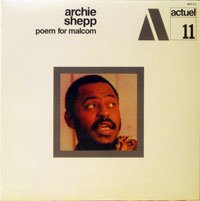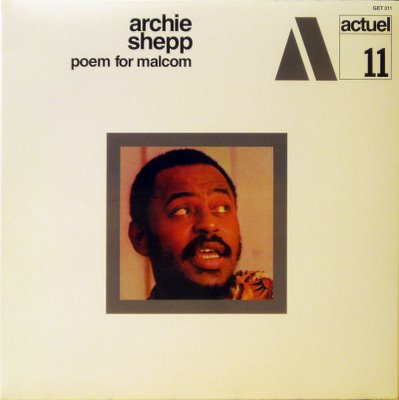
ARCHIE SHEPP
Poem for Malcolm
BYG Actuel 11
Recorded 14th August 1969
Side One
- Mama Rose – Poem for Malcolm
Side Two
- Rain Forest – Oleo
Personnel
Side 1;
Archie Shepp (soprano sax, voice), Burton Greene (piano), Alan Silva (bass), Claude Delcloo (drums), Philly Joe Jones (tympani)
Side 2;
Grachan Moncur III (trombone), Archie Shepp (tenor sax, piano), Hank Mobley (tenor Sax), Vince Benedetti (piano), Malachi Favors (bass), Philly Joe Jones (drums)
This is the second of Archie Shepp’s 3 sessions recorded in Paris in August 1969 (the others being the 12th August session that produced “Yasmina, a Black Woman” and one on the 16th August, producing the album “Blasé”).
It’s very different in style to either of the other two sessions. Where Yasmina is groove and hard-bop based and Blasé has the song-based format that would later be developed on albums like “Attica Blues” and “The Cry of my People”, this LP is very much a vehicle for the group’s free jazz tendencies, featuring as it does two extended pieces of free blowing.
Side one serves as a backdrop for Shepp’s poetry, his passionate delivery fitting in well with the tumultuous musical backdrop. You can imagine, listening to this, how traditional jazz critics would dismiss this as a lot of nonsense – indeed, allmusic.com don’t even bother to review it before giving out a humble 2 star rating. But this is a far better record than that rating might suggest – the conviction with which it is played carries it through, the whole being greater, perhaps, than the sum of the parts, which is so often the case with this style of jazz.
Side two finds Miles Davis’ “Oleo” being transformed from it’s highly bop-influenced original into an extended vehicle for Shepp’s blowing which captivates the listener for the first ten minutes or so before a thunderous drum roll announces the increase to a rapid tempo and the introduction of the band. Special mention must be made here of the trumpet playing, which is more than a match for the furious percussion and has a wonderful full sound that survives intact through the murk of the poor recording quality. This serves as a jumping off point for a few short Shepp explorations, but by this stage in the piece his major work is over and he leaves the floor to the sidemen who ably fill the remaining minutes, before a second drum solo at the 17 minute mark announces a shift to a more conventional post-bop ending in which the ghost of Miles’ original can vaguely be discerned rising up through the storm to take over the closing theme.
This is an exciting listen and a must for any Shepp fan or lover of avant-garde jazz.


No comments:
Post a Comment